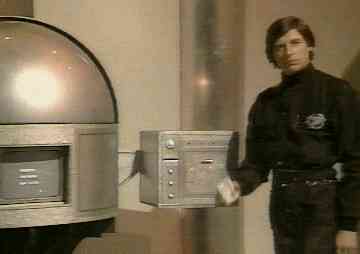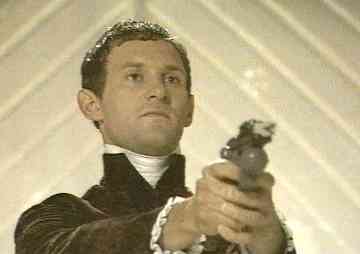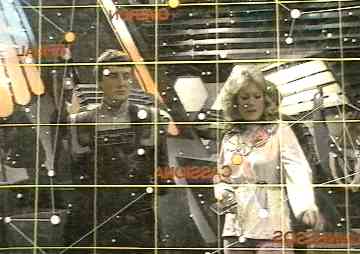
Young Ensor's pistol was fitted with an energiser, which could be set to automatic, discharging the weapon if he relaxed his trigger finger. Energisers might have been a feature of most or all energy weapons, although the automatic fire feature may not have been.
Liberator had at least seven energy banks, since Dayna mentioned bank seven in Terminal.
Some information was given in The Web. Once caught in the Web, Liberator had enough power for 100 hours of thrust (presumably sublight flight at full power?). Each shot fired by the neutron blasters reduced this time by three hours. Power banks 1 and 2 were drained after two shots, but the prior state of the ship's energy reserves was not stated and they may have been almost drained or full before these shots were fired.
Further information on the energy banks (or power banks, as they were sometimes called) was given in Duel. At the start of the episode, four banks were exhausted and required 48 hours to recharge (implicitly, 12 hours per bank, but this could be a gross oversimplification). Low power reserves restricted ship speed, since Standard by 2 was stated to be the best manageable speed, and even then not for long with reserves so low. When the ship came under attack, banks 5, 6 and 7 were on full power, the rest on zero (confirming the presence of no more than seven banks on Liberator). The ship was then subjected to a number of hits by plasma bolts, the force wall activated only for the period of impact. Bank 5 was reduced to 70% power after one hit, to 40% after 3 hits and to 0% after 6 hits. If nothing else, this implies that a hit is never simply a hit.
In Hostage the Liberator was hit by at least 12 plasma bolts, after which the energy banks were reduced to 45% capacity.
Also in Duel, it was noted that a pursuit ship had insufficient power to keep firing after loosing seven plasma bolts. This was the only reference to power reserves and consumption in such a vessel.
A feature of the planet Sardos, whose stratosphere comprised two energy fields. The inner one was impervious; the outer one was refractive to all medium-pulse emissions. In short, no medium-pulse energy, including light, could get in or get out. This measure was the result of the Sardoans deciding to avoid any form of social contact which might lead to genetic change.
A feature of Crandor, to which only the Thaarn and the Caliph had access. They were apparently selective in what they affected, since electronic equipment was seen operating on Crandor (doors, for example) but Avon and the others found their weapons useless. When talking to the Thaarn, Cally complained that the energy isolaters made it difficult for her to trust her own sense of judgement, since she could detect their activity telepathically. She persuaded him to turn them off, allowing the crew and Liberator to escape.
|
A device developed by the isolated community on Sardos that could record the
molecular pattern of any object and recreate it as many times as desired.
Rock was used as a raw material ("Precious stones," commented Servalan),
converted to energy and then back to mass in the desired pattern. Living
matter could be physically replicated but the duplicates were dead. Some of
the transformers on Sardos were large enough to duplicate buildings, and
Grose and Lector intended to use them to build themselves a fleet of battle
cruisers.
|  |
| An agent of Largo in Space City, probably a title within the hierarchy of the Terra Nostra. Largo's enforcer tracked down Bek and Hanna in their escape attempt. He later killed Largo and, with the Chairman's approval, secured possession of Largo's assets. He used the same kind of pistol as Tynus in Killer. |  |
[1] Renowned computer expert who, at the age of 18, developed the Tarial Cell, leading to a whole new generation of computers. He also developed other radical new concepts in the field of computer technology. He suffered a massive heart attack whilst on vacation on a frontier planet, and the medical facilities there were unable to give him a new heart. Instead he was fitted with a prosthetic organ, powered by microcells with a life span of 40 years. Shortly afterwards he disappeared, having fled to Aristo.
Before his disappearance he tutored the young Muller, instilling a fanatical work drive that led to the development of the megalomaniac android Muller built on Pharos. Orac called Ensor "a tyrant for self-discipline". Ensor also met Dorian at some time, and Dorian later described him to Avon as "never a gracious man".
On Aristo he designed and built Orac, his ultimate achievement, and attempted to sell it to the Federation for 100 million credits. He accepted Blake and Cally when they arrived on Aristo, and gave them the decontaminant drugs they needed for the other members of the crew suffering from radiation sickness. When Servalan and Travis arrived, Ensor led Blake and Cally out through a secret exit, but died in the tunnels before reaching the surface. Blake left him there.
Ensor lived far underground, where he kept tropical fish and a number of potted plants. He also frequently listened to a recording of a cardinal singing.
Some confusion surrounds the length of Ensor's exile. In Deliverance Ensor's son referred to "thirty years of independence" when talking to Maryatt, and in Rescue Avon told Dorian that Ensor had spent the last twenty years of his life in hiding. Ensor himself mentioned not having left his underground complex for "more than forty years".
[2] Ensor's son, who went with him to Aristo at the age of four and later approached the Federation with his father's offer to sell Orac. Young Ensor journeyed back to Aristo with Space Surgeon Maryatt, but their journey was interrupted when a bomb planted by Servalan forced them to crashland on Cephlon. Ensor, badly injured, was brought aboard, and took Cally hostage to force Blake to take him to Aristo. He died of his injuries on the way.
On reboarding the Liberator after the Intergalactic War, Avon was informed by Zen that Blake was on his way to Epheron in the Loritol system. No further information was given, save that it was home to several primitive life forms.
| One of the possible sources of treatment for Gan's malfunctioning limiter. Although it had the appropriate level of technology, the inhabitants were stated by Jenna to be hostile to humanoid life "and Homo sapiens in particular". It was 200 hours away from the Liberator's position at the time. |  |
| Base Commander on Centero, who informed Travis of the molecular shift detector monitoring the communications centre for arrivals by teleport. |  |